Tales Of Symphonia
Rob's in Japanese RPG heaven - again!
Order yours now from Simply Games.
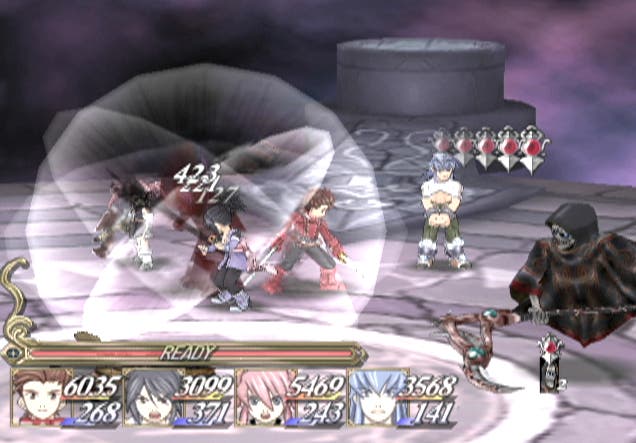
There's no doubt that this is going to be one of the best, and most expensive, winters ever for gamers. Of course, the first person shooter fans are more than amply catered for, with Half-Life 2, Halo 2 and Metroid Prime: Echoes all arriving within the space of a few weeks, and those seeking their fix of crime capers are already ensconced in GTA San Andreas, with The Getaway Black Monday to come. Football fans already have FIFA 2005 and Pro Evolution Soccer 4 to kick about, and Football Manager 2005 and the Xbox Live enabled version of PES4 make November into a month full of promise for fans of the beautiful game as well.
For fans of RPGs, the season is looking pretty festive as well. We've already had the superb Fable and the epic Star Ocean: Till the End of Time; and assuming you're in a position to do some judicious importing, you could also potentially have your hands on Shadow Hearts Covenant, Shin Megami Tensei: Nocturne, Baten Kaitos and a number of other less well-known games by the time Christmas Eve rolls around. You might want to drop the credit card and step away from the mod chip, though - because one of the best RPGs of the year won't require you to walk any further than your local high street. And it's on the GameCube, no less; will wonders never cease?
Tall Tales
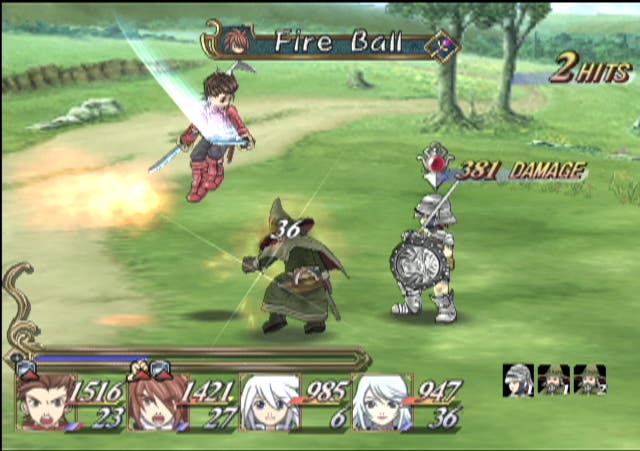
Namco isn't necessarily a name you'd associate with high quality role-playing games if your gaming is confined to PAL releases, in which case you'll have missed out on the likes of Xenosaga, which is generally very highly regarded but not fit, apparently, for European consumption - thanks, guys! However, in Japan, the company's RPG franchises are a big deal, arguably second only to Square Enix' stable of blockbusters, and that's in no small part thanks to the Tales Of... series of games.
Tales of Symphonia is the latest incarnation of this popular series, and while it certainly shares some heritage with its predecessors in terms of graphical style and game mechanics, it's not necessary for you to have played any of the previous games, as it is set in a different world and features entirely new characters, in much the same way that Final Fantasy reinvents itself with (almost) every new game.
Illustrated with the kind of lavish cel-shaded cartoon graphics that the GameCube does so well, Symphonia follows the quest of a young band of heroes who set out to accompany the messianic "Chosen of Mana" on a journey to regenerate the world by reawakening the Goddess Martel. Although it initially seems relatively simple and cliché-ridden, the game actually does a surprisingly good job of dropping plot twists on you later on, and it presents a strong cast of characters whose individual storylines and character development is fun to watch.
Conservative?
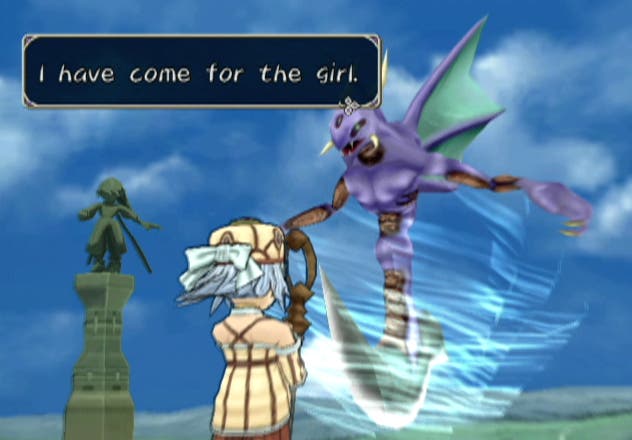
As is almost obligatory in Japanese RPGs, you play as a teenage boy (with compulsory spiky hair, although not blond - oooh, controversial) who must protect his friends, learn from his mistakes, come to terms with the demons of his unknown past, and ultimately save the world. There's a refreshing lack of being washed up on a beach with no memory, though, and in fact Lloyd Irving is a character who is well developed throughout the story, with the writers thankfully of the persuasion which says that dark revelations of the past are not a substitute for creating a proper personality for your characters.
The remainder of the large cast of characters is equally well-developed throughout the course of the game, and a number of interesting ploys are used to allow the player to connect with the characters - most notable being the optional "skits", which can be triggered by pressing the Z button at certain points in the game. These are just snatches of dialogue between the characters, with facial animations in 2D windows on-screen, and while they're often intended to be humorous, they also perform an important role in giving an insight into the relationships between the characters.
Then again, you'd expect the game to develop its characters well (although the degree to which it does so is a pleasant surprise), since it has so much time to do it with. Tales of Symphonia is an epic beast of a game, spread across two discs and clocking in at a solid sixty to eighty hours completion time; its first story arc alone, which only really sets up the characters and prepares you for the first set of revelations about the nature of the world you're playing in, encompasses more gameplay time than we've had out of many RPGs in their entirety. Thankfully, though, the game doesn't drag on, and in fact it's a pleasure to play for long periods of time - rarely frustrating or badly balanced, and with a battle system that's both actively enjoyable to play, and largely optional.
Real-Time Riot
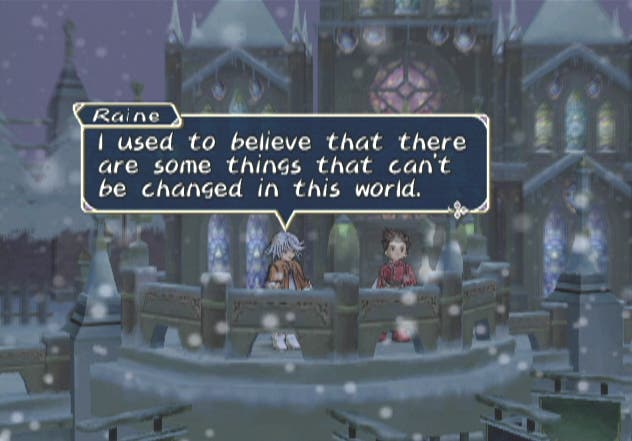
Battles in Tales of Symphonia are - wait for it - real-time. That's right folks; you'll play mostly as Lloyd (you can choose which character to play as, but we stuck with Lloyd after experimenting with the others because he's simply the most fun) and get stuck into the action, swinging your sword around like crazy. Battles take place on a curiously implemented 2D plane; you view the world mostly side-on and can move back and forwards towards the enemy you're targeting, a bit like a beat 'em up. However, there are four characters in the battle, and your three allies may be targeting different enemies, so there's a fair bit of milling around and movement on screen, although rarely enough to get confusing thanks to the use of large, distinctive character designs.
Simple attacks and combos are carried out by tapping the A button and using the analogue stick, while special attacks are bound to combinations of B and a direction in the menu system. You can always pause a battle to issue commands to your teammates, change your equipment load-out or pick a different enemy to target, and the battles are generally fast, fun and well-balanced. The system compares very well to Star Ocean 3's real-time battle system; Symphonia's characters have significantly more intelligent AI and can be fine-tuned in their behaviour by the player if the default settings don't work for you (they're generally fine, though). Arguably more importantly, the battle system doesn't require Streetfighter levels of skill in terms of combat - tapping a button rhythmically to get a combo out isn't exactly taxing, and while you can do more complex things by combining special and normal attacks into longer combos, none of it is entirely necessary.
Battles can also be pretty impressive affairs - as you get further into the game and Genis, the young Elven magic user who is Lloyd's best friend (and regular kick-toy of the party for having a smart mouth) gets a handle on more and more powerful spells, you'll find yourself in the middle of a spectacular show as your combo attacks are joined by a bombardment of high-level magic from the sidelines. It's all great eye-candy, battles are usually brief and enjoyable, load delays going into them are minimal, and if you want to, you can skip most encounters - since monsters all appear on the world map or in dungeons, and if you're careful you can wander around them and avoid fighting.
Unfinished Symphonia
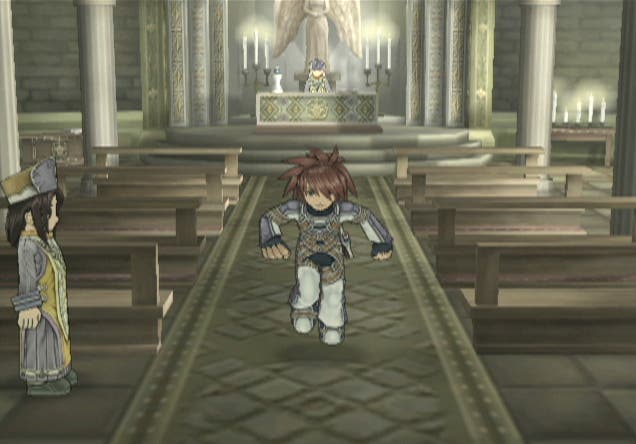
Although we're unquestionably sold on the game as a whole, there are certainly a few minor problems with Tales of Symphonia. For one, the music is fairly unremarkable - which is a shame, because the world itself is beautifully constructed, and deserves an impressive score to go along with it. On the topic of audio, though, it's worth noting that the voice acting is almost uniformly excellent (which is rare praise from us, as we're not great fans of dubbing), and in fact we were a little disappointed not to have voice acting in the skit scenes (which seem a bit silent and drawn-out as a result, because the characters' mouths flap but you only get subtitles on screen, no actual voices).
Another slightly disappointing aspect of the game is the fact that after a stunningly well-animated intro movie, it's almost entirely bereft of proper cutscenes - even in scenes which had clips in the intro! It's by no means a showstopper, but seeing a little more of that gorgeous AIC animation wouldn't have hurt. Finally, there are a few places where the graphics get a little ropey - most notably in scenes where the game gets a bit over-enthusiastic with its depth of field blurring effect, resulting in characters just looking badly smeared rather than out of focus.
The problem with Tales of Symphonia, in the final analysis, is the simple fact that from the outset, this feels like an incredibly traditional Japanese RPG, and that's going to dissuade a lot of people from trying it. Which is a shame, because this is arguably the finest example ever made of the truly traditional Japanese RPG. It may be clichéd, and altogether a little too bright and happy for its own good, but Tales of Symphonia is nonetheless epic, enjoyable, and superbly constructed, and deserves an audience far in excess of merely the hardcore JRPG fans who will undoubtedly snap it up with glee.

